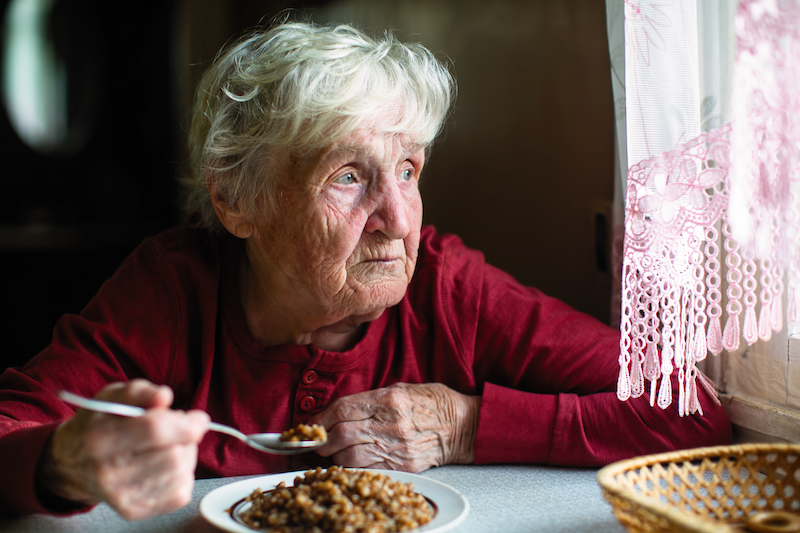
by Cindy Heilman | Leadership, Resident Centered Dining Service

According to the U.S. Census Bureau, approximately one-third of all older adults live solo. Many of these people are lonely, which can happen even when surrounded by others, as in a senior independent living community. Not all widows have the confidence to approach others to open conversations and make new friends. It isn’t easy for everyone to do.
It can be awkward for an older person, especially a woman, to enter a dining room alone. She may be fearful of asking to join a table and being rejected. This doesn’t apply to everyone, but enough to put up an alert flag.
Once the problem is recognized, it can be corrected. When you are educated, a trained food serving team, who sees the same resident daily, is aware of the dilemma, they can change an unhappy frame of mind to a confident, happy one by being social.
Training teaches your food servers how to open up conversations and introduce diners to others they know will be receptive. The recent pandemic affected many older adults who had busy lives with a circle of friends to share their thoughts and activities.
The pandemic ended with quarantines and the loss of their friends. Computers and Facetime only helped to hold on a bit.
When older people are living in social isolation, they often lose their appetite.
Losing weight brings declining health.
Stress and rising blood pressure follow loneliness to decrease their quality of life.
Your trained food serving team becomes a key factor when noticing plates of food not eaten and depletion of a response from the person they serve. They can reach out to build up the spirit of a resident by bringing good news, a little story to share, or just passing the time of day with a happy attitude.
One person on your food serving team can make a tremendous difference. Imagine what your entire team can do when they are educated to be alert to the dilemma.
Kind Dining♥ coaching series encourages empowering your staff with skills and tools to aid residents by connecting with them daily. This increases an engaged and purpose-driven staff and a resident population that is happier and healthier.
Providers investing time and energy will create career paths for all who participate, not just jobs to be tended to. Our excellent training series may influence younger staff and part-timers to consider staying in the senior care marketplace.
We teach how to combat loneliness with a support network of friends, family, and staff.
Opening conversations at mealtimes is a small item that plays an enormous role in social action that improves the lives of your residents and your food servers, too.
Be♥ Kind: Taking notice of a resident’s downward change in attitude can alert a problem.

by Cindy Heilman | Build Communities of Belonging, Resident Centered Dining Service

“It’s probably a reflection of my own, if I may say, loneliness.” This quote is from the famous American artist Edward Hopper (1882–1967). He was a master at conveying loneliness and isolation in his paintings. To look at them is to feel loneliness seeping into your skin. Morning Sun, painted in 1957, could easily depict exactly what some older adults in senior living communities feel; loneliness.
Further, suppose you look on Sunday 1926. In that case, you feel the isolation many people are now overcoming in senior care communities with the assistance of highly trained staff, especially the food servers in close contact. Some experienced the emotion during and coming out of the recent pandemic.
It is common knowledge that many residents in assisted living and retirement communities are still lonely. Many people want to reverse this epidemic of loneliness. I am one of them. Loneliness is a significant factor in declining health and increases the risk of Alzheimer’s disease. The disease rapidly progresses in lonely older adults. Blood pressure and stress levels rise. When your educated, trained food serving team carries an aura of friendliness and conversation while serving meals, they offer a welcome hospitality that relieves loneliness. Your residents will feel cared for and comforted. They will also be healthier for it. Kind Dining♥ wants to teach you how to close the gap between food servers and resident diners using education, awareness, and understanding while building relationships.
My name is Cindy Heilman, and I work with people every day who want to reverse this epidemic of loneliness, people who want to find more meaning in their work by showing more kindness and appreciation for those they serve. Our Kind Dining® principles and practices, now in an eLearning format, make learning stick and help people implement insights. I wrote a book, Hospitality for Boomers, on how to attract residents and keep good team members. As a result of my work, clients often share their staff has a new sense of purpose, gets along better, and keeps their focus and energy on what matters most.
We are proud to announce that Kind Dining® is now approved for 11 Continuing Professional Education credits for RDNs, & NDTRs, as well as CDMs. CPEs are from the Commission on Dietetic Registration (CDR), the credentialing agency for the Academy of Nutrition and Dietetics. This includes 1 Ethics unit for the entire series. The CPEs for Certified Dietary Managers are from the Certifying Board of Dietary Managers (CBDM), the credentialing agency for the Association of Nutrition and Foodservice Professionals.
Be♥ Kind Tip: Loneliness is a significant factor in declining health.



